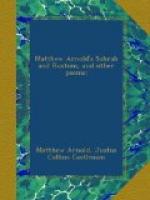“He was most distinctly on the side of human enjoyment. He conspired and contrived to make things pleasant. Pedantry he abhorred. He was a man of this life and this world. A severe critic of this world he indeed was; but, finding himself in it, and not precisely knowing what is beyond it, like a brave and true-hearted man, he set himself to make the best of it. Its sights and sounds were dear to him. The ‘uncrumpling fern, the eternal moonlit snow,’ the red grouse springing at our sound, the tinkling bells of the ‘high-pasturing kine,’ the vagaries of men, of women, and dogs, their odd ways and tricks, whether of mind or manner, all delighted, amused, tickled him.
* * * * *
“In a sense of the word which is noble and blessed, he was of the earth earthy.... His mind was based on the plainest possible things. What he hated most was the fantastic—the far-fetched, all-elaborated fancies and strained interpretations. He stuck to the beaten track of human experience, and the broader the better. He was a plain-sailing man. This is his true note.”—Mr. Augustine Birrell.
“He was incapable of sacrificing the smallest interest of anybody to his own; he had not a spark of envy or jealousy; he stood well aloof from all the bustlings and jostlings by which selfish men push on; he bore life’s disappointments—and he was disappointed in some reasonable hopes—with good nature and fortitude; he cast no burden upon others, and never shrank from bearing his own share of the daily load to the last ounce of it; he took the deepest, sincerest, and most active interest in the well-being of his country and his countrymen.”—Mr. John Morley.
In his essay on Arnold, George E. Woodberry speaks of the poet’s personality as revealed by his letters in the following beautiful manner: “Few who did not know Arnold could have been prepared for the revelation of a nature so true, so amiable, so dutiful. In every relation of private life he is shown to have been a man of exceptional constancy and plainness.... Every one must take delight in the mental association with Arnold in the scenes of his existence ... and in his family affections. A nature warm to its own, kindly to all, cheerful, fond of sport and fun, and always fed from pure fountains, and with it a character so founded upon the rock, so humbly serviceable, so continuing in power and grace, must wake in all the responses of happy appreciation and leave the charm of memory.
“He did his duty as naturally as if it required neither resolve nor effort, nor thought of any kind for the morrow, and he never failed, seemingly, in act or word of sympathy, in little or great things; and when to this one adds the clear ether of the intellectual life where he habitually moved in his own life apart, and the humanity of his home, the gift that these letters bring may be appreciated. That gift is




